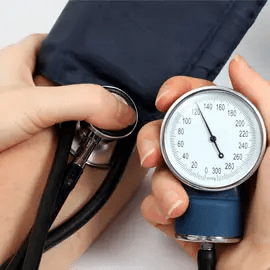Understanding Hypertension
 Blood pressure measures the force of blood against the walls of the arteries as the heart beats. If this pressure remains consistently high, this can cause a number of health issues. According to the National Institute of Health, approximately 1 in 3 adults in the US have hypertension, also known as high blood pressure.
Blood pressure measures the force of blood against the walls of the arteries as the heart beats. If this pressure remains consistently high, this can cause a number of health issues. According to the National Institute of Health, approximately 1 in 3 adults in the US have hypertension, also known as high blood pressure.
People who have hypertension often experience few or no symptoms, but over time, their bodies may still suffer harmful effects, including heart, blood vessel and kidney damage.
Hypertension is a serious condition that may lead to a number of other health problems, such as:
- Heart disease
- Eye disease
- Heart failure
- Kidney failure
- Strokes
Blood Pressure Measurements
Measured in millimeters of mercury, or mmHg, your blood pressure measurement contains two numbers that reflect your systolic pressure and your diastolic pressure. Systolic pressure describes your blood pressure when your heart beats and diastolic pressure refers to your blood pressure while your heart rests between beats. Your systolic measurement appears above your diastolic measurement, such as 120/80 mmHg, which describes normal blood pressure levels.
The normal range for blood pressure is under 120 systolic and under 80 diastolic pressures.
Someone with Stage 1 hypertension will have a systolic pressure between 140-159 or a diastolic pressure between 90-99. Stage 2 hypertension is described by a systolic pressure over 160 or a diastolic pressure over 100.
Causes of Hypertension
While the exact causes of high blood pressure are unclear, certain factors seem to contribute to an increased risk of developing high blood pressure. These include:
- Obesity
- Older age
- Genetics
- Poor diet
- Minimal exercise
Treating Hypertension
Since obesity is one of the leading causes of hypertension, weight loss is often an effective treatment for hypertension. Other lifestyle changes may help reduce high blood pressure. In particular, the following changes may help:
- Quitting smoking
- Getting regular exercise, at least 30 minutes a day
- Changing to a low-fat, low salt diet, complete with fresh fruits and vegetables, lean proteins and whole grains
- Avoiding or limiting alcohol
If lifestyle changes do not help improve blood pressure, medications may be needed to help normalize blood pressure levels. Medications for high blood pressure may include:
- ACE inhibitors
- Beta-blockers
- Alpha-blockers
- Calcium channel blockers
Since high blood pressure may not produce symptoms, it’s important to see a doctor regularly for check-ups. If high blood pressure is discovered, losing weight and making diet and exercise changes may be prudent first steps in helping to lower blood pressure.
